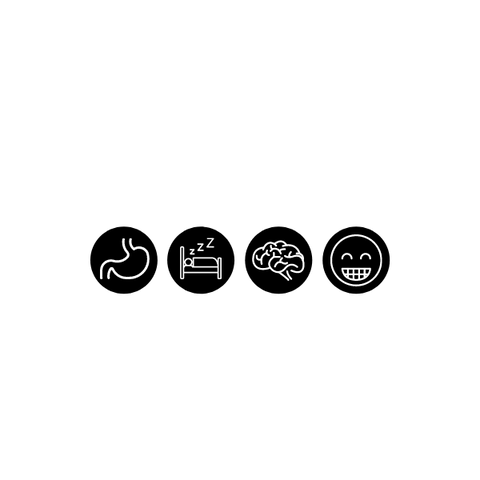Have you noticed that everyone seems to be affected by cannabis differently? One person can end up in a hysterical laughing fit while the other says this cannabis has no effect on me. Have you ever wondered why two different people can consume the same exact strain of hemp or marijuana and yet have drastically different experiences?
The way our bodies interact with the cannabinoids (like CBD or THC) that are found in cannabis is extremely complicated, and we’re only just now beginning to unearth all of the functions of our endocannabinoid system. That being said, there are some concrete reasons why individual people have unique responses to cannabis. First, let’s see how the Cannabis Sativa L. plant can affect our brains.
What Effect Does Cannabis Have on the Brain?

Cannabis interacts with our bodies through the endocannabinoid system, sometimes shortened to ECS. The ECS is a system of neurotransmitters and enzymes that send messages to our brains and central nervous systems. It works by producing molecules called endocannabinoids, which are extremely similar to the cannabinoids found in the cannabis plant. These molecules bind to CB1 and CB2 receptors located to control key functions of homeostasis such as:
- appetite
- sleep
- memory
- mood
When we consume cannabinoids, they bind to our cannabinoid receptors in similar ways that the endocannabinoids do.
What Are the Short-Term Effects of Cannabis?
Cannabis, especially when consumed through inhalation methods such as smoking, vaping, or using our elon®, can bring on a shift in feeling and perception rather rapidly. Some of the immediate effects of cannabis include; feelings of euphoria, drowsiness, changes in appetite, relaxation, body sensations, and increased feelings of anxiety. Studies have shown that cannabis may also increase heart rate but there is limited evidence that These effects will vary from person to person, depending on a myriad of factors. Let’s take a look at some of the common reasons why cannabis can affect different people differently.
Set And Setting

When we talk about set and setting, we’re talking about where you are in physical space and what you’re mentally bringing into that space.
A pleasant setting in a familiar environment is conducive to a good experience with cannabis, or any psychedelic for that matter. Similarly, if you’re not in a great headspace to begin with, cannabis use may be more likely to exacerbate your negative emotions, anxiety, or other adverse effects of cannabis.
It’s usually a good idea to get into a comfortable setting before taking high doses of THC. While arriving at a good mental state presents a slightly more challenging problem than relocating to a room with soft lighting and fuzzy blankets, meditation works wonders at relaxing the mind.
Genetics

Now that we’ve mapped the human genome, we know more about the role genetics can play in all sorts of human function, so it only makes sense that they’d play a role in cannabis as well.
One recent study found that your genes can play a role in how your brain retains memory while under the influence, which might explain why some people are more prone to short-term memory loss or forgetfulness when consuming cannabinoids.
It also turns out that around 20% of the population has a genetic mutation that increased the levels of endocannabinoids in the body. People with this mutation will find that they have fewer withdrawal effects when stopping cannabis use than those without it.
Tolerance

One of the most significant determining factors in how strong the effects of cannabis will present in a given person is tolerance. To put it simply, tolerance is a measure of how accustomed one is with consuming cannabinoids.
For one, a person who is a daily user of cannabis will be familiar with the effects that cannabis can cause, while a first time user can end up being blindsided. There’s also a scientific component.
Our bodies are incredibly adaptable. If we continuously expose them to cannabinoids, our ECS will adjust, weakening or altering our CB1 and CB2 receptors, gradually decreasing the efficacy of external cannabinoids like THC and CBD. This is also why it’s common for heavy users to take periodic tolerance breaks by discontinuing use completely for a small period of time. This allows the ECS to return to its normal function and results in cannabis being overall more effective.
Health and Body

Many people use cannabis as a therapeutic or medicinal plant to treat various ailments. People with conditions like Dravets Syndrome have radically different brain chemistries than the average recreational consumer, and so cannabis will affect them differently.
Other physical differences can play a role in how cannabis will affect us. For example, people with less BMI may find that they require less of the plant to achieve their desired effect, and even biological sex influences the way cannabis interacts with the body.


